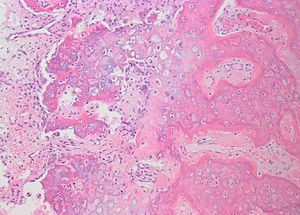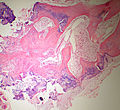Difference between revisions of "Bizarre parosteal osteochondromatous proliferation"
Jump to navigation
Jump to search
(→External links: +cat.) |
|||
| (11 intermediate revisions by 2 users not shown) | |||
| Line 1: | Line 1: | ||
{{ Infobox diagnosis | {{ Infobox diagnosis | ||
| Name = {{PAGENAME}} | | Name = {{PAGENAME}} | ||
| Image = | | Image = Bone Bizzare Parosteal Osteochondromatous Proliferation MP2.jpg | ||
| Width = | | Width = | ||
| Caption = | | Caption = Bizarre parosteal osteochondromatous proliferation. [[H&E stain]]. | ||
| Synonyms =Nora lesion | | Synonyms = Nora lesion | ||
| Micro = | | Micro = disorganized cellular cartilage with a blue tint and patchy ossification matures into disorganized bone, proliferation of fibroblasts surrounds the bone/cartilage and occupies the intertrabecular spaces | ||
| Subtypes = | | Subtypes = | ||
| LMDDx = | | LMDDx = periosteal [[chondrosarcoma]], periosteal [[chondroma]], low grade parosteal [[osteosarcoma]], [[osteochondroma]] | ||
| Stains = | | Stains = | ||
| IHC = | | IHC = | ||
| Line 15: | Line 15: | ||
| Gross = | | Gross = | ||
| Grossing = | | Grossing = | ||
| Site = | | Site = [[bone]] (see ''[[chondro-osseous tumours]]'') - hands and feet | ||
| Assdx = | | Assdx = | ||
| Syndromes = | | Syndromes = | ||
| Line 21: | Line 21: | ||
| Signs = | | Signs = | ||
| Symptoms = | | Symptoms = | ||
| Prevalence = | | Prevalence = rare | ||
| Bloodwork = | | Bloodwork = | ||
| Rads = | | Rads = | ||
| Endoscopy = | | Endoscopy = | ||
| Prognosis = | | Prognosis = benign/locally aggressive | ||
| Other = | | Other = | ||
| ClinDDx = | | ClinDDx = | ||
| Tx = | | Tx = | ||
}} | }} | ||
'''Bizarre parosteal osteochondromatous proliferation''', also known as '''Nora lesion''', is a distinctive rare lesion of the hand or foot.<ref name=pmid19057740>{{Cite journal | last1 = Gruber | first1 = G. | last2 = Giessauf | first2 = C. | last3 = Leithner | first3 = A. | last4 = Zacherl | first4 = M. | last5 = Clar | first5 = H. | last6 = Bodo | first6 = K. | last7 = Windhager | first7 = R. | title = Bizarre parosteal osteochondromatous proliferation (Nora lesion): a report of 3 cases and a review of the literature. | journal = Can J Surg | volume = 51 | issue = 6 | pages = 486-9 | month = Dec | year = 2008 | doi = | PMID = 19057740 }}</ref> | |||
==General== | ==General== | ||
A distinctive osteochondromatous proliferation of hands and feet. | A distinctive osteochondromatous proliferation of hands and feet. | ||
Population: | |||
*Young adults | *Young adults. | ||
*20s | *Typically age (years) 20s and 30s.<ref name=pmid19057740/> | ||
Prognosis: | |||
*Benign. | |||
*Locally aggressive. | |||
==Location== | ==Location== | ||
Hands and feet | *Hands and feet. | ||
==Radiology== | ==Radiology== | ||
Marginated wide based bony growth projecting into the soft tissues<ref>http://radiopaedia.org/articles/bizarre-parosteal-osteochondromatous-proliferation</ref> | *Marginated wide based bony growth projecting into the soft tissues.<ref>URL: [http://radiopaedia.org/articles/bizarre-parosteal-osteochondromatous-proliferation http://radiopaedia.org/articles/bizarre-parosteal-osteochondromatous-proliferation]. Accessed on: 29 November 2014.</ref> | ||
==Gross== | ==Gross== | ||
*Nodule covered with glistening cartilage | *Nodule covered with glistening [[cartilage]]. | ||
==Microscopic== | ==Microscopic== | ||
Disorganized cellular cartilage with a blue tint and patchy ossification matures into disorganized bone. | Features: | ||
*Disorganized cellular cartilage with a blue tint and patchy ossification matures into disorganized bone. *Proliferation of fibroblasts surrounds the lesion and occupies intertrabecular spaces. | |||
DDx: | |||
* | *Periosteal [[chondrosarcoma]]. | ||
* | *Periosteal [[chondroma]]. | ||
* | *Low grade parosteal [[osteosarcoma]]. | ||
* | *[[Osteochondroma]]. | ||
== | ===Images=== | ||
<gallery> | |||
Image:Bone BizzareParostealOsteochondromatousProliferation PA (2).JPG |Notice the disorganized blue tinted cartilage with partial ossification merging into mature bone. | |||
* | Image:Bone BizzareParostealOsteochondromatousProliferation PA.JPG |A loose proliferation of fibroblasts fills the spaces between the bony trabeculae. | ||
* | Image:Bone Bizzare Parosteal Osteochondromatous Proliferation MP.jpg|Medium power | ||
Image:Bone Bizzare Parosteal Osteochondromatous Proliferation MP2.jpg|Medium power | |||
Image:Bone Bizzare Parosteal Osteochondromatous Proliferation MP3.jpg|Medium Power | |||
Image:Bone Bizzare Parosteal Osteochondromatous Proliferation HP.jpg|High power | |||
</gallery> | |||
www: | |||
*[http://www.webpathology.com/slides-13/slides/Bone_BizarreParostealOsteochondromatousProlif_Xray.jpg BPOP - radiology (webpathology.com)]. | |||
*[http://pathologyoutlines.com/wick/bizarre%20parosteal%20osteochondromatous%20proliferation%20(bpop-%20no.jpg BPOP (pathologyoutlines.com)]. | |||
== | ==Diagnostic categories== | ||
*Cartilaginous neoplasms | *Cartilaginous neoplasms. | ||
*Osteocartilaginous neoplasms | *Osteocartilaginous neoplasms. | ||
==Molecular== | ==Molecular== | ||
t(1:17)(q32;q21)<ref>{{Cite journal | last1 = Kuruvilla | first1 = S. | last2 = Marco | first2 = R. | last3 = Raymond | first3 = AK. | last4 = Al-Ibraheemi | first4 = A. | last5 = Tatevian | first5 = N. | title = BizarreParosteal Osteochondromatous Proliferation (Nora's lesion) with translocation t(1;17)(q32;q21): a case report and role of cytogenetic studies on diagnosis. | journal = Ann Clin Lab Sci | volume = 41 | issue = 3 | pages = 285-7 | month = | year = 2011 | doi = | PMID = 22075515 }} | *t(1:17)(q32;q21).<ref>{{Cite journal | last1 = Kuruvilla | first1 = S. | last2 = Marco | first2 = R. | last3 = Raymond | first3 = AK. | last4 = Al-Ibraheemi | first4 = A. | last5 = Tatevian | first5 = N. | title = BizarreParosteal Osteochondromatous Proliferation (Nora's lesion) with translocation t(1;17)(q32;q21): a case report and role of cytogenetic studies on diagnosis. | journal = Ann Clin Lab Sci | volume = 41 | issue = 3 | pages = 285-7 | month = | year = 2011 | doi = | PMID = 22075515 }}</ref> | ||
</ref> | |||
==Sign out== | ==Sign out== | ||
BIZARRE PAROSTEAL OSTEOCHONDROMATOUS PROLIFERATION (NORA LESION). | *BIZARRE PAROSTEAL OSTEOCHONDROMATOUS PROLIFERATION (NORA LESION). | ||
MARGIN STATEMENT. | *APPROPRIATE MARGIN STATEMENT. | ||
==See also== | ==See also== | ||
* | *[[Chondro-osseous tumours]]. | ||
==References== | ==References== | ||
{{Reflist|1}} | {{Reflist|1}} | ||
==External links== | |||
*[http://www.pathologyoutlines.com/topic/bonebizarreparosteal.html BPOP (pathologyoutlines.com)]. | |||
[[Category:Diagnosis]] | |||
[[Category:Chondro-osseous tumours]] | |||
Latest revision as of 02:43, 30 November 2014
| Bizarre parosteal osteochondromatous proliferation | |
|---|---|
| Diagnosis in short | |
 Bizarre parosteal osteochondromatous proliferation. H&E stain. | |
|
| |
| Synonyms | Nora lesion |
|
| |
| LM | disorganized cellular cartilage with a blue tint and patchy ossification matures into disorganized bone, proliferation of fibroblasts surrounds the bone/cartilage and occupies the intertrabecular spaces |
| LM DDx | periosteal chondrosarcoma, periosteal chondroma, low grade parosteal osteosarcoma, osteochondroma |
| Site | bone (see chondro-osseous tumours) - hands and feet |
|
| |
| Prevalence | rare |
| Prognosis | benign/locally aggressive |
Bizarre parosteal osteochondromatous proliferation, also known as Nora lesion, is a distinctive rare lesion of the hand or foot.[1]
General
A distinctive osteochondromatous proliferation of hands and feet.
Population:
- Young adults.
- Typically age (years) 20s and 30s.[1]
Prognosis:
- Benign.
- Locally aggressive.
Location
- Hands and feet.
Radiology
- Marginated wide based bony growth projecting into the soft tissues.[2]
Gross
- Nodule covered with glistening cartilage.
Microscopic
Features:
- Disorganized cellular cartilage with a blue tint and patchy ossification matures into disorganized bone. *Proliferation of fibroblasts surrounds the lesion and occupies intertrabecular spaces.
DDx:
- Periosteal chondrosarcoma.
- Periosteal chondroma.
- Low grade parosteal osteosarcoma.
- Osteochondroma.
Images
www:
Diagnostic categories
- Cartilaginous neoplasms.
- Osteocartilaginous neoplasms.
Molecular
- t(1:17)(q32;q21).[3]
Sign out
- BIZARRE PAROSTEAL OSTEOCHONDROMATOUS PROLIFERATION (NORA LESION).
- APPROPRIATE MARGIN STATEMENT.
See also
References
- ↑ 1.0 1.1 Gruber, G.; Giessauf, C.; Leithner, A.; Zacherl, M.; Clar, H.; Bodo, K.; Windhager, R. (Dec 2008). "Bizarre parosteal osteochondromatous proliferation (Nora lesion): a report of 3 cases and a review of the literature.". Can J Surg 51 (6): 486-9. PMID 19057740.
- ↑ URL: http://radiopaedia.org/articles/bizarre-parosteal-osteochondromatous-proliferation. Accessed on: 29 November 2014.
- ↑ Kuruvilla, S.; Marco, R.; Raymond, AK.; Al-Ibraheemi, A.; Tatevian, N. (2011). "BizarreParosteal Osteochondromatous Proliferation (Nora's lesion) with translocation t(1;17)(q32;q21): a case report and role of cytogenetic studies on diagnosis.". Ann Clin Lab Sci 41 (3): 285-7. PMID 22075515.





